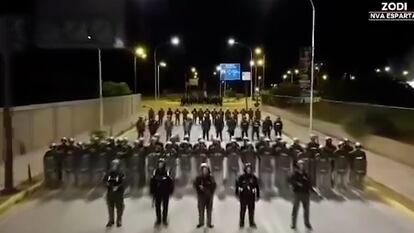Dozens of Venezuelan soldiers protect one of the last statues of Hugo Chávez
Protesters who took to the streets over suspected fraud in the presidential election have torn down monuments in tribute to the commander in several cities in the country


Around a hundred soldiers are guarding the area where what could be the last statue of Hugo Chávez in Venezuela is located. With his right arm raised and pointing to the sky, the monument in honor of Chávez is in the state of Nueva Esparta. Since the morning of July 29, after the National Electoral Council CNE announced that Nicolás Maduro had won the presidential elections, thousands of citizens have taken to the streets to protest, expressing their anger at the suspected fraud. As a sign of their indignation, they have torn down five statues of Chávez.
“My commander is staying, he is staying,” can be heard in one of the videos circulating on social media, in which the Armed Forces of the state of Nueva Esparta can be seen guarding the monument of Chávez, the former president of Venezuela, who started the Bolivarian Revolution. Last week, there were attacks against four statues of the commander president. The first was knocked down on Shema Saher Avenue in Coro, in the state of Falcón, in the north of the country. The second in Plaza Urdaneta, in the state of Guárico. The third was destroyed in Plaza Bolívar in the port state of La Guaira. The fourth attack was recorded in Mariara, in the central state of Carabobo, where the statue was decapitated, and its head dragged by motorcyclists. The last occurred in the town of Las Tejerías, in the state of Aragua, in the central-northern region of Venezuela.
“They went to attack Commander Chavez, Commander President, the best president Venezuela has had in 150 years,” Nicolás Maduro said in a televised address on Monday. Maduro dismissed the symbolism of the actions, calling the protesters “envoys from the opposition.” However, the toppling of the statues does not appear to have been organized by any specific group. Attorney General Tarek William Saab also downplayed the incidents, referring to them as “small pockets of violence.” He also said that around 800 people have been arrested during the protests.
“Maduro, with his anti-popular conduct and behavior, has succeeded in making the people who loved Chávez so much tear down his statues and protest against his supposed re-election,” said Yeni Parra, a citizen of Caracas, when asked about her opinion of the toppling of the statues in an interview on a Venezuelan television channel.
Monuments to Chávez began to be erected in different parts of the country after his death in March 2013, even though this went against his own stated wishes. “I beg you not to put my name on anything,” Chávez urged on August 3, 2008. “No, no, no. No Hugo Chávez Street, no Hugo Chávez Bridge. No, for the love of God, that brings bad luck! These structures must be named after the heroes of Independence,” he told the program Hello, President!
However, his words did not always match his actions, as, over almost 14 years in power, he encouraged or allowed a cult of personality to be created around him. This is not the first time that symbols of Chavismo have been attacked in response to collective outrage. Similar incidents were seen in 2017 and 2019, in several regions that until recently were considered electoral strongholds of Chavismo.
Sign up for our weekly newsletter to get more English-language news coverage from EL PAÍS USA Edition
Tu suscripción se está usando en otro dispositivo
¿Quieres añadir otro usuario a tu suscripción?
Si continúas leyendo en este dispositivo, no se podrá leer en el otro.
FlechaTu suscripción se está usando en otro dispositivo y solo puedes acceder a EL PAÍS desde un dispositivo a la vez.
Si quieres compartir tu cuenta, cambia tu suscripción a la modalidad Premium, así podrás añadir otro usuario. Cada uno accederá con su propia cuenta de email, lo que os permitirá personalizar vuestra experiencia en EL PAÍS.
¿Tienes una suscripción de empresa? Accede aquí para contratar más cuentas.
En el caso de no saber quién está usando tu cuenta, te recomendamos cambiar tu contraseña aquí.
Si decides continuar compartiendo tu cuenta, este mensaje se mostrará en tu dispositivo y en el de la otra persona que está usando tu cuenta de forma indefinida, afectando a tu experiencia de lectura. Puedes consultar aquí los términos y condiciones de la suscripción digital.








































